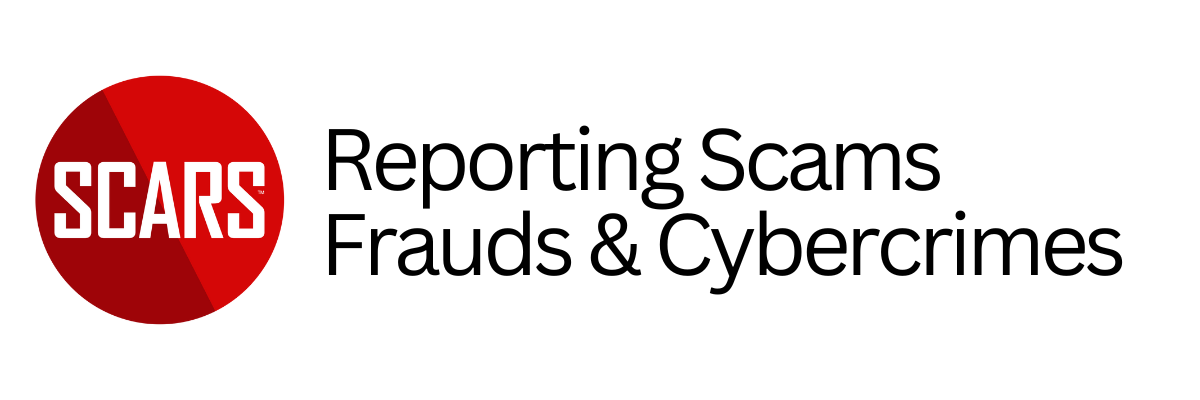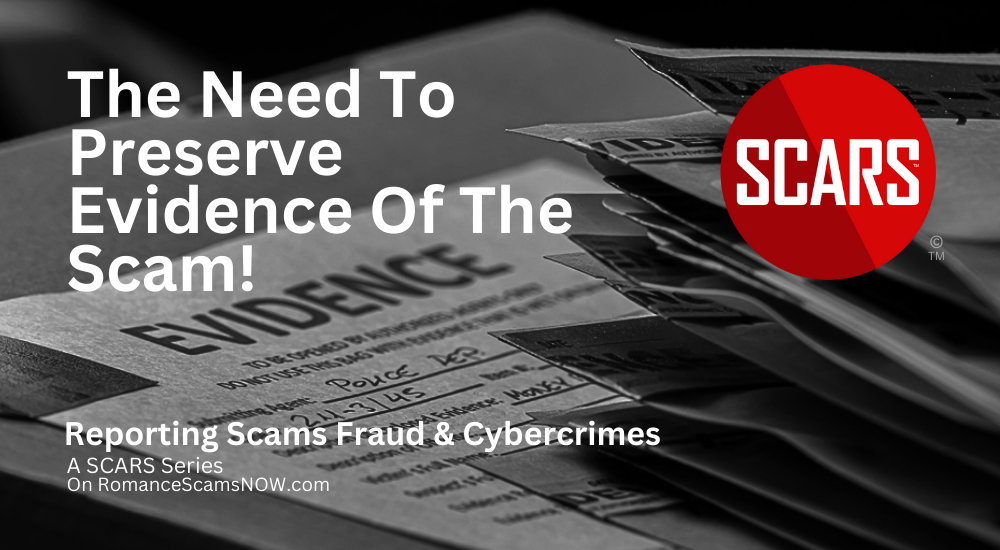Author:
• Tim McGuinness, Ph.D. – Anthropologist, Scientist, Director of the Society of Citizens Against Relationship Scams Inc.
Article Abstract

Safeguarding Justice: The Crucial Role of Evidence Preservation in Reporting Cybercrimes
In an era dominated by digital interactions, the rise of cybercrimes, scams, and fraud has become an unfortunate reality.
As victims navigate the aftermath of these incidents, they often find themselves in the role of digital detectives, tasked with preserving critical evidence that could bring perpetrators or scammers to justice. Beyond aiding law enforcement, the importance of preserving evidence extends to various facets of combating cyber threats.
Why the Evidence Matters
<ore and more, law enforcement is arresting scammers, and when they do, they often investigate who the scammers have victimized. This leads them to the identities of victims who did not even report, and if those victims have preserved their evidence they are in a better position to see their case added to the charges against the arrested scammers, fraudsters, or cybercriminals. This also improves the chance of eventual money recovery from restitution.
Preserving evidence of a scam is a must for scam victims for several reasons:
- Legal Proceedings: Preserved evidence can serve as a foundation for legal action against scammers. Whether pursuing civil remedies or criminal prosecution, documented evidence strengthens the case and increases the likelihood of a successful outcome.
- Law Enforcement Investigations: Law enforcement agencies rely on evidence to investigate and prosecute scammers. Preserved evidence provides investigators with valuable insights into the nature of the scam, its perpetrators, and their methods, facilitating more effective enforcement actions.
- Pattern Recognition: Preserved evidence when reported helps authorities identify patterns and trends in scam activities. By analyzing multiple cases, law enforcement can uncover broader schemes, track the movements of criminal networks, and implement targeted interventions to disrupt their operations.
- Preventing Further Victimization: Sharing evidence with law enforcement and relevant agencies helps prevent further victimization. By alerting authorities to the tactics and strategies used by scammers, victims contribute to the development of preventive measures and public awareness campaigns, reducing the risk for others.
- Recovery and Restitution: Preserved evidence may aid in the recovery of stolen assets or financial losses. In cases where scammers are apprehended and prosecuted, victims may be eligible for restitution or compensation. Detailed evidence strengthens their claims and supports the restitution process.
- Victim’s Impact Statements and Sentencing: The evidence will help scam victims create better victim impact statements that can have a dramatic effect on the sentences that these criminals receive when convicted.
- Educational Purposes: Preserved evidence can be used for educational purposes to raise awareness about scams and educate the public on how to recognize and avoid them. By sharing their experiences and evidence, victims help empower others to protect themselves from falling prey to similar schemes.
Preserving evidence of a scam empowers victims to seek justice, aids law enforcement in combating cybercrime, and contributes to the prevention of future victimization. It serves as a tangible reminder of the scammer’s actions and ensures that their illicit activities do not go unchecked.
Preserving the Digital Trail
When confronted with a scam or cybercrime, it’s easy to underestimate the significance of seemingly mundane digital artifacts. However, that suspicious email, phishing attempt, or ransomware message represents more than just pixels on a screen – it is tangible evidence with the potential to halt criminal operations and initiate legal proceedings.
Of course, if you were not actually victimized, just report it and then it is no longer needed. But if a victim was harmed in a scam, then the evidence if always needed and scam victims should resist the urge to just delete thinking that it will help them to recover.
Law enforcement agencies, equipped with the right evidence, can trace the digital trail left by cybercriminals. This includes investigating the origin of phishing emails, tracking financial transactions, and identifying patterns in the modus operandi of hackers. For these investigations to be effective, victims must play a proactive role in safeguarding and providing evidence.
Remember that it does not matter if you hear back from an agency after reporting the crime. Many times they simply do not have the resources to follow up unless they need more information or are actively investigating. Sharing the evidence is a critical component in helping law enforcement to make informed decisions and aid their investigations.
Comprehensive Evidence
The array of evidence that can substantiate a cybercrime report can be extensive. Victims should diligently compile and secure documents that might be linked to the incident. This could include canceled checks, certified mail receipts, chatroom or newsgroup transcripts, credit card receipts, and even physical items like envelopes or web links.
Digital evidence is equally crucial, encompassing log files with date and time stamps, social media messages, wire receipts, and copies of emails and web pages. Preserving these electronic documents in their original format, including full email headers, ensures their integrity and authenticity, bolstering the strength of the evidence.
Evidence Items That Should Be Preserved:
Always keep the evidence items in a safe location in the event you are asked to provide them for investigative or prosecution purposes.
All of the following documentation might be considered evidence, but you should keep anything you think could be related to the incident:
- Canceled checks (copies of either sent or received checks)
- Certified or other mail receipts
- Chat or message text
- Credit card receipts
- Envelopes (if you received items via FedEx, UPS or U.S. Mail or other courier)
- Scanned documents (sent or received, including PDF files)
- Log files, if available, with date, time and time zone (most victims will not have these)
- Social media profiles, posts, and messages
- Money transfer order receipts
- Pamphlets or brochures
- Phone bills and call summaries
- Copies of emails, preferably electronic copies. If you print the email, include full email header information
- Copies of web pages, preferably electronic
- Wire transfer receipts and recorder
- Cryptocurrency purchases, wallet information, and transfers
A Toolkit for Justice
Preserving evidence serves as a toolkit for justice, enabling not only the identification and prosecution of cybercriminals but also acting as a deterrent against future crimes. By keeping a detailed record of the incident, victims contribute to the collective effort to curb cyber threats and protect others from falling victim to similar schemes.
Learn more about this here: Reporting Scams – A Scam Victim’s Checklist (romancescamsnow.com)
We also recommend our low-cost SCARS RED BOOK Cybercrime Organized: SCARS RED BOOK – Your Personal Scam Evidence & Crime Record – SCARS Company Store (againstscams.org)
The Role of Victims in Cybercrime Prevention
Victims of cybercrimes are unwittingly thrust into the frontline of cybercrime prevention. Their meticulous preservation of evidence acts as a shield against the evolving tactics of cybercriminals. Moreover, it facilitates collaboration between victims and law enforcement agencies, fostering a symbiotic relationship that strengthens the overall cybersecurity landscape.
Summary
In the scam and cybercrime age, where the battle against cyber threats is forever ongoing, the role of evidence preservation cannot be overstated.
It is a fundamental aspect of reporting cybercrime to preserve the evidence, ensuring that law enforcement agencies have the necessary tools to pursue investigations.
Beyond that, preserving evidence empowers victims to actively participate in the collective effort to retain their law enforcement and reporting options, while safeguarding their future potential recovery. We have seen several cases where the government has forced financial companies to reimburse victims over the years, but that is only possible when the scam victims retain the evidence.
By recognizing the importance of preserving evidence, victims become integral contributors to justice and catalysts for positive change in the fight against cybercrime.
Important Information for New Scam Victims
- Please visit www.ScamVictimsSupport.org – a SCARS Website for New Scam Victims & Sextortion Victims
- Enroll in FREE SCARS Scam Survivor’s School now at www.SCARSeducation.org
- Please visit www.ScamPsychology.org – to more fully understand the psychological concepts involved in scams and scam victim recovery
If you are looking for local trauma counselors please visit counseling.AgainstScams.org or join SCARS for our counseling/therapy benefit: membership.AgainstScams.org
If you need to speak with someone now, you can dial 988 or find phone numbers for crisis hotlines all around the world here: www.opencounseling.com/suicide-hotlines
More Reporting Scams & Interacting With The Police:
- Reporting Scams – A Scam Victim’s Checklist (romancescamsnow.com)
- SCARS RED BOOK – Your Personal Scam Evidence & Crime Record – SCARS Company Store (againstscams.org)
- Reporting Scams Worldwide (romancescamsnow.com)
- Victim’s Impact Statements (romancescamsnow.com)
- Law Enforcement & Police – Article Catalog (romancescamsnow.com)
SCARS Resources:
- Getting Started Right: ScamVictimsSupport.org
- Sextortion Scam Victims: Sextortion Victims Support – The Essentials (scamvictimssupport.org)
- For New Victims of Relationship Scams newvictim.AgainstScams.org
- Subscribe to SCARS Newsletter newsletter.againstscams.org
- Sign up for SCARS professional support & recovery groups, visit support.AgainstScams.org
- Join our Scam Survivors United Chat & Discussion Group facebook.com/groups/scam.survivors.united
- Find competent trauma counselors or therapists, visit counseling.AgainstScams.org
- Become a SCARS Member and get free counseling benefits, visit membership.AgainstScams.org
- Report each and every crime, learn how to at reporting.AgainstScams.org
- Learn more about Scams & Scammers at RomanceScamsNOW.com and ScamsNOW.com
- Scammer photos ScammerPhotos.com
- SCARS Videos youtube.AgainstScams.org
- Self-Help Books for Scam Victims are at shop.AgainstScams.org
- Donate to SCARS and help us help others at donate.AgainstScams.org
- Worldwide Crisis Hotlines: https://blog.opencounseling.com/suicide-hotlines/
Other Cyber Resources
- Block Scam Domains: Quad9.net
- Global Cyber Alliance ACT Cybersecurity Tool Website: Actionable Cybersecurity Tools (ACT) (globalcyberalliance.org) https://act.globalcyberalliance.org/index.php/Actionable_Cybersecurity_Tools_(ACT)_-_Simplified_Cybersecurity_Protection
- Wizer Cybersecurity Training – Free Security Awareness Training, Phishing Simulation and Gamification (wizer-training.com)
-/ 30 /-
What do you think about this?
Please share your thoughts in a comment below!
Do You Need Support?
Get It Now!
SCARS provides the leading Support & Recovery program for relationship scam victims – completely FREE!
Our managed peer support groups allow victims to talk to other survivors and recover in the most experienced environment possible, for as long as they need. Recovery takes as long as it takes – we put no limits on our support!
SCARS is the most trusted support & education provider in the world. Our team is certified in trauma-informed care, grief counseling, and so much more!
To apply to join our groups visit support.AgainstScams.org
We also offer separate support groups for family & friends too.
Become a
SCARS STAR™ Member
SCARS offers memberships in our STAR program, which includes many benefits for a very low annual membership fee!
SCARS STAR Membership benefits include:
- FREE Counseling or Therapy Benefit from our partner BetterHelp.com
- Exclusive members-only content & publications
- Discounts on SCARS Self-Help Books Save
- And more!
To learn more about the SCARS STAR Membership visit membership.AgainstScams.org
To become a SCARS STAR Member right now visit join.AgainstScams.org
To Learn More Also Look At Our Article Catalogs
Scam & Crime Types
More SCARS
- ScamsNOW Magazine – ScamsNOW.com
- ContraEstafas.org
- ScammerPhotos.com
- AnyScam.com – reporting
- AgainstScams.org – SCARS Corporate Website
- SCARS YouTube Video Channel













Leave A Comment